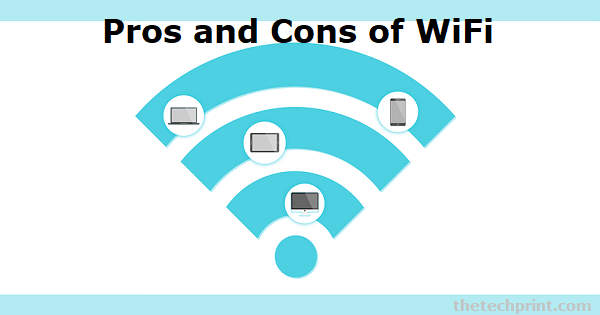WiFi networks have become increasingly popular in recent years as a means of connecting devices to the internet. However, there are both pros and cons to using WiFi, which should be considered before setting up a network. Whether you are looking to set up a WiFi network for business or for personal use, there are both pros and cons of WiFi to consider. Let's have a look at the possible benefits and considerable drawbacks one by one.
There are no hassles with having wired mesh throughout the area, being connected wirelessly, gives you access to the internet anywhere within the range. Some other noteworthy pros of WiFi include:
Wifi networks increase data communication efficiency by allowing people to communicate from virtually any place. People may check statistics or sales figures at their leisure without having to return to their desks if they are in a meeting room or on the phone in another office or room.
The ability to stay connected at all times, no matter where you go, is a significant advantage of wireless network installation. Wireless network technology's higher degree of coverage will assist your company in reacting faster and more effectively.
The cost of setting up and maintaining a WiFi network is significantly lower than that of a wired network. The hardware for a wireless network is also cheaper since there are no cables or other physical infrastructure required.
A key advantage of WiFi networks is that they are very scalable, meaning that they can be easily expanded to cover larger areas or more devices as needed. This is much more difficult with wired networks, which require the installation of new cables and other infrastructure whenever an expansion is needed.
Another big advantage of WiFi networks is that they offer improved flexibility over wired networks. With a wireless network, you can quickly and easily add new devices or users without having to worry about installing new cable infrastructure.
This is ideal for businesses that need to be able to rapidly expand their network or for home users who want to add new devices without having to worry about messy wiring. Apart from scalability, flexibility adds to the pros of a WiFi networks in a business environment.
WiFi networks can also offer enhanced security features over wired networks. With the right configuration, you can set up a WiFi network so that only authorized users can access it, making it much more secure than a wired network.
However, there are some potential cons of WiFi networks that should be considered before setting one up. These include:
One of the biggest potential problems with WiFi networks is interference from other electronic devices. This can cause problems with data throughput and reliability, and can even lead to complete signal loss in some cases. The interference can emanate from printers, LCD displays, and other electronic devices that can easily disturb the network.
Another potential issue with WiFi networks in range. Depending on the power of the router and other factors, a WiFi network may only have a range of a few hundred feet. This can be problematic if you need to cover a large area with your network or if you have obstacles that block the signal.
The speed of a WiFi connection can also be slower than a wired connection, depending on the distance from the router and the number of users on the network. Be it your workplace or home, if a WiFi router is placed away from you, you may face such cons of WiFi network oftentimes.
Even though WiFi networks can offer enhanced security features, they are also more susceptible to security breaches than wired networks. This is because the data is transmitted wirelessly, making it more difficult to protect.
While the initial cost of setting up a WiFi network may be lower than a wired network, the ongoing costs can be higher. This is because you will need to purchase additional routers and access points as your needs expand.
Conclusion on the pros and cons of WiFi Network
WiFi is a convenient way to get online, but there are some risks associated with using unsecured networks. If you’re going to use WiFi, it’s important to be aware of these risks and take steps to protect your data. At the same time, there are also some great benefits to using WiFi – it can save you money on your cellular data plan and make it easier to stay connected when you’re on the go. Hopefully, these pros and cons will help you decide what to choose while setting up a network for your home or business.

A wireless network is a complicated system that allows devices to communicate with each other wirelessly for data sharing. It's a simple and cheap approach to connecting with your wifi router or other gadgets wirelessly without the use of wires.
The answer to this question depends on many factors. In general, however, a wireless network is usually cheaper and easier to set up than a wired network. Additionally, a wireless network offers more flexibility in terms of where users can access the network, making it ideal for businesses that have employees who work remotely or travel frequently.
WiFi is a type of wireless network that allows devices to connect to the internet. While all WiFi networks provide internet access, not all internet access is provided by WiFi. For example, you can also connect to the internet via a wired Ethernet connection or a mobile data connection.
One of the potential drawbacks of using a WiFi network is interference from other electronic devices.